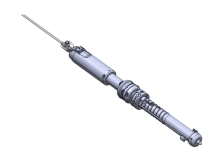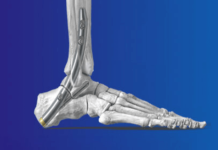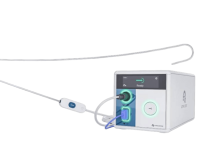Median Technologies, manufacturer of eyonis™, a suite of artificial intelligence (AI) powered Software as a Medical Device (SaMD) for early cancer diagnosis, and a globally leading provider of AI-based image analyses and central imaging services for oncology drug developers, disclosed today pivotal study RELIVE’s final results, which confirm and complement the top-line results released on February 3, 2025.
This successfully concludes the pivotal studies of Median’s AI/ML-based computer aided detection and diagnosis (CADe/CADx) SaMD, eyonis™ Lung Cancer Screening (LCS), a key requirement for regulatory submissions in the US and Europe.
Related: AtaCor Medical enrolls first patient in ASCEND-EV trial
The US FDA filing is on track for formal submission in May 2025, shortly followed by filing for CE marking in Europe in June. Consequently, given normal review times, Median expects eyonis™ LCS’ FDA 510(k) clearance in Q3 2025 and CE marking in Q1 2026, as previously communicated.
The eyonis™ LCS SaMD was developed for the following intended use: firstly, to allow early detection and characterisation of probably benign, suspicious or very suspicious lung nodules in order to aid cancer diagnosis and to drive the clinical management of patients; secondly, to aid radiologists in the detection, localisation, characterisation and assessment of pulmonary nodules from medical images by generating a proprietary result report that highlights lung nodules as “probably benign” or “suspicious” or “very suspicious” and scores nodules individually; and, thirdly, to aid the identification of tumor at its earliest stage, to allow better patient care while reducing the number of unnecessary tests, procedures and healthcare costs.
Based on a highly enriched cohort, RELIVE study final results show that Median’s eyonis™ LCS SaMD met all key endpoints, demonstrating statistically significant performance, superior to state of the art, as well as device safety and efficacy.
The results support the intended use for which eyonis™ LCS was developed, which was shared with the EU Notified Body and discussed with the FDA during the Q-submission phase. Device efficacy and safety in line with intended use are mandatory requirements for obtaining marketing authorisations from regulatory bodies in the US and Europe.
“We have achieved the efficacy and safety goals that we set for the intended use and marketing of eyonis™ LCS to aid diagnose lung cancer – this is a tremendous achievement and good news for patients, health professionals and our shareholders,” said Fredrik Brag, CEO of Median Technologies. “Now, our team at Median is working with confidence to prepare the regulatory submissions for marketing authorisations in U.S. and Europe. In parallel, we are already preparing for a successful commercial launch of eyonis™ LCS in the US and Europe.”
Median Technologies intends to present pivotal study results including RELIVE study data, at upcoming ad-hoc medical and scientific conferences and submit scientific papers in peer-reviewed publications in the coming quarters.
If caught early, lung cancer can most often be cured. AI-based Software as Medical Device will facilitate the scalability of lung cancer screening programs worldwide. Median Technologies has developed eyonis™ LCS as a unique artificial intelligence based SaMD to scale up Low Dose CT lung cancer screening programs in the United States, Europe and the rest of the world in order to save people’s lives, support medical professionals in completing more screening procedures and reduce healthcare costs.
About lung cancer screening in the U.S.: Lung cancer screening is recommended by the U.S. Preventive Services Task Force (USPSTF) in adults aged 50 to 80 years who have a 20 pack-year smoking history and covered by Medicare; the eligible population is currently of 14.5 million people. There already is an existing reimbursement of $650 per SaMD procedure creating a substantial commercial opportunity to improve patient care in this addressable market. Furthermore, the eligible patient number is expected to rise in the coming years, driven by planned broadening of the eligible U.S. population by USPSTF. Similarly, new lung screening program deployments are planned in Europe and Asia.




